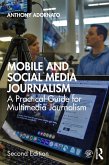Dieser Download kann aus rechtlichen Gründen nur mit Rechnungsadresse in A, B, BG, CY, CZ, D, DK, EW, E, FIN, F, GR, HR, H, IRL, I, LT, L, LR, M, NL, PL, P, R, S, SLO, SK ausgeliefert werden.
'An incredibly clear and useful guide to how mobile technologies are re-shaping our connections to locations and to other people. In considering devices that range from the paperback book to the portable music player to the smartphone as different kinds of "interfaces" with public space, the authors offer great insight into how we filter, control, and manage our relations with spaces and social situations that blur the boundaries between private and public. This is a much-needed contribution to the literature on the new location-based technologies that will become increasingly significant in the coming decade. Consider it an operating manual for the future.' - Mimi Sheller, Professor of Sociology and Director of the Mobilities Research and Policy Center at Drexel University
'Mobile Interfaces in Public Spaces is an historically situated and nuanced account of the role interfaces - from books and Walkmans to iPods and mobile phones - play in our relationships to self, others and everyday urban life. Connecting contemporary practice with classic social theory, this evocative and engaging book is a much needed contribution to this cutting edge field of research.' - Heather A. Horst, RMIT University, Australia
'Highly recommended...In this thought-provoking volume, Silva and Frith consider the impact of location-aware mobile technologies on the human sense of identity, privacy, and control in public spaces. The authors effectively address this emerging area of scholarship, providing insight and discussing relevant theory...Extensively sourced and well written, this engaging title, part of the "Routledge Research in Cultural and Media Studies" series, is a welcome addition to the scholarship in this area.' - CHOICE magazine, D. D. Tritt, University of South Carolina Aiken, USA









